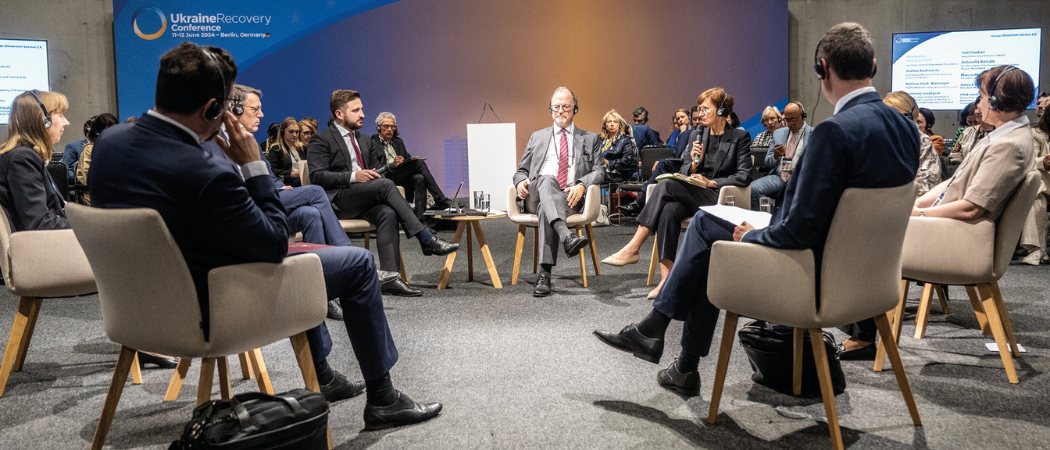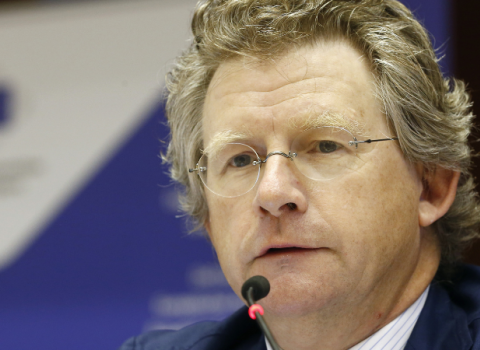A new plan sets out long-term priorities for rebuilding Ukraine’s science system. A Ukrainian academic believes more must be done

A panel discussion, featuring Patrick Cramer, president of the Max Planck Society, on education, science and innovation at the Ukraine Recovery Conference on 12 June. Photo credits: Hans-Joachim Rickel / German Federal Ministry of Education and Research
A coordinated approach to supporting and rebuilding Ukraine’s science ecosystem is necessary and should be planned for now, the Alliance of German Science Organisations said as it set out a new plan with a long-term scope.
In a paper published this week, the Alliance of ten major German research organisations put forward a vision for how, with the support of Germany and the wider international community, there can be a move from providing short-term emergency assistance for Ukrainian science and scientists, to more sustainable and long-lasting strategies.
Patrick Cramer, president of the Max Planck Society, a member of the alliance, told Science|Business the plan has been launched as a basis for coordinating ongoing and future support for Ukraine.
“After a preliminary phase of immediate humanitarian aid, which has been very effective, we have begun to reflect upon and further develop these schemes,” he said. “We would like to advocate for more coherent and complementary support from science, politics and various donors.”
Since Russia’s full-scale invasion of Ukraine in February 2022, various ad-hoc support schemes for Ukrainian scientists and academics have been set up around Europe and the world.
There are national schemes to provide jobs and opportunities for Ukrainian academics and scientists displaced by the war, funding schemes to finance Ukrainian research teams, as well as networking, professional and personal support initiatives.
The EU also has also been active. In December last year, the European Innovation Council launched a €20 million package of support for start-ups; the European Institute of Innovation and Technology opened a start-up support hub in Kyiv; and a Kyiv Horizon Europe office was opened to help researchers and entrepreneurs access EU research grants. These are in addition to previously launched schemes such as ERA4Ukraine, Horizon4Ukraine and ERC4Ukraine.
The EU’s €50 billion Ukraine Facility aid package also includes money to rebuild infrastructure as well as new construction projects.
Further afield, in April the US National Academy of Sciences launched its Science and Innovation Fund for Ukraine, with an initial $8 million in funding.
With its action plan, the German alliance wants a more thoughtful approach, broken into short-, medium- and long-term actions.
The short-term priorities should, as now, provide flexible assistance for scientists and research infrastructure. In the medium-term, as soon as large-scale hostilities end, there needs to be system change, such as reforming or establishing new, specialised research universities, forming international partnerships, and strengthening Ukraine’s research funding agencies.
Longer term, once the war ends, the goal should be not to sideline education, research and innovation at a time when much of the focus will be on infrastructure reconstruction. The German alliance says that while rebuilding destroyed facilities and institutions is need, it is essential also to invest in human capital and supporting scientists and support staff.
Fairytale
Maria Moskovko, a Ukrainian PhD student at Lund University in Sweden, welcomed the German plan, saying it is important to start looking to the future.
“Waiting for the end of the war to start rebuilding could lead to missed opportunities,” she said. “I think a lot can be done now, so looking at short-, mid- and long term strategies is good.”
The ad-hoc support for Ukrainian science and scientists has been working, but it was also important to have a coordinated approach to make sure that resources and time were not wasted, Moskovko said. “For the Ukrainian government and scientists, it’s important to have a platform and dialogue to coordinate international efforts to support science.”
Irina Yehorchenko, a senior researcher at the Institute of Mathematics of the National Academy of Sciences of Ukraine, is far more sceptical. “There is a huge myth that there are a lot of opportunities for Ukrainian academics,” she said. “This is a fairytale, in reality probably only around 1% of scientists and academics are benefitting from these.”
At the outbreak of the full-scale Russian invasion, Yehorchenko took up an invitation from the Polish Academy of Sciences’ Mathematical Institute to continue her work in Warsaw. There, she received a US-Polish backed grant that had no research element, and later won funding from Poland’s National Science Centre.
She moved back to Kyiv by choice last year. She is hugely grateful for the support she received from Poland, but says what is needed now is assistance for academics and scientists who are in Ukraine.
Salaries for researchers in Ukraine are too low, there are not enough funding opportunities or support to apply for international grants and there is no funding to attend scientific conferences, Yehorchenko said.
“The Ukrainian government has never done enough for science, it’s a tradition of governments to absolutely ignore science. Ukraine has many talented researchers and scientists, but the ecosystem only survives due to their hard work, and not through systemic support,” she said.
Yehorchenko is not even thinking about the long term. “At the moment, Ukrainian science just needs to survive,” she said.
Big promises
Such a scathing assessment of support for Ukrainian science was largely absent from talks at the high-level Ukraine Recovery Conference in Berlin this week. On a panel dedicated to science and education, European politicians, academics and representatives of international organisations outlined their commitment to supporting Ukraine’s scientific reconstruction and reforms.
Yevhen Kudriavets, Ukraine’s first deputy minister of education and science, talked up the importance of reforming the research and innovation system, from grant proposals to evaluation procedures, as well as setting out the country’s ‘Global Innovation Vision 2030’ strategy to drive competitiveness and international growth.
The question of financing the rebuilding of Ukraine’s science system was not directly touched upon. At the outset of the conference, European Commission president Ursula von der Leyen said that €1.5 billion in windfall profits from frozen Russian assets would be delivered to Ukraine this summer, with 90% going towards defence and 10% to reconstruction.
How much will go towards the reconstruction of academic infrastructure is unclear. A UNESCO report published earlier this year estimated the cost of reconstructing Ukraine’s public science infrastructure at over €1.26 billion. Moskovko, who contributed information to the report, said the cost is likely to have increased, adding that “research and education organisations have been intentional targets of attacks by Russians”.
A survey earlier this year showed 59% of respondents think rebuilding Ukraine will be an economic burden for the EU.
Cramer, who presented the German alliance’s action plan at the Berlin conference, disagrees with this. “We believe that support for reform and reconstruction of Ukrainian science will be well worth its costs,” he said. “A strong Ukraine with the ability to unfold its scientific and technological potential within the European Research Area benefits us all.”





 A unique international forum for public research organisations and companies to connect their external engagement with strategic interests around their R&D system.
A unique international forum for public research organisations and companies to connect their external engagement with strategic interests around their R&D system.